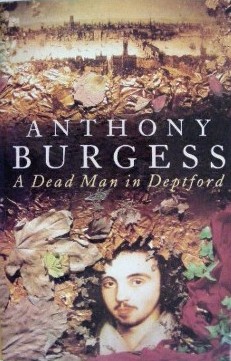“Anthony Burgess [1917-93] was a novelist of indisputable genius who never published an indisputably great novel,” according to Dana Gioia (11/30/97 NYT). I am very impressed with his last novel, A Dead Man in Deptford. Obviously, the narrator could not know and report much of this rich portrait of Christopher Marlowe (1564-93), but as a former boy-actress fucked by Kit, he is a good choice.

It was a bit difficult getting accustomed to the cadences of an evocation of Elizabethan speech and it has taken me a long time to finish, but the text has many pleasures, especially for anyone who can resonate with the fully drawn sexual orientation (centering on Tom Walshingham, nephew of the head of the spy service). It is an antidote to the heterosexualization of Shakespeare.
There is no gender-bending except that the narrator played the lead women’s parts (before Marlowe’s or Shakespeare’s best work). The espionage aspect fits with Jack Nicholl’s (The Reckoning: The Murder of Christopher Marlowe, 1992), which convinced me that Marlowe had been a spy (on Catholics and perhaps on atheists, when the state and the Church of England were one and divergence was treason) and hung out with other spies. He may have been murdered after a long day of failing to be convinced by others from the Essex faction (he being in the Raleigh one). The placement of the wound makes it unlikely that he had someone else’s dagger that somehow ended up in or just above his eye.
The book is a very sympathetic recapturing of one writer cut down young by an elderly writer capping a substantial ouevre that is probably being quickly forgotten (except for A Clockwork Orange, and Stanley Kubrick’s adaptation of the truncated American version of that novel). Burgess’s learning and wit are in the same league as Tom Stoppard, who is very fashionable at the moment, especially here, where “Indian Ink” is the “hot ticket.” Dead Man fits chronologically between “Elizabeth” and “Shakespeare in Love,” with some overlap with both these popular mult-nominated movies.
I have also written about homosexuality in Burgess’s early novels, The Long Day Wanes and Honey for the Bears. (Burgess was by no means a “gay novelist,” btw).
© 11 March 1999, Stephen O. Murray

